- Home
- Joel C. Rosenberg
The Auschwitz Escape Page 2
The Auschwitz Escape Read online
Page 2
Luc could hear the sirens of fire trucks and ambulances approaching from the west. He knew he should rush to his brother-in-law’s side and help the wounded and the wailing. But for a moment he hesitated—not because he didn’t want to help but because he wanted to understand what was truly unfolding.
He turned to his right, looking toward the east, and what he saw nearly knocked the wind out of him. It was a sight apparently lost on all the people around, for they were riveted on the death and destruction that had already been wrought. They couldn’t see what was coming. But Luc saw it, and he stood there unable to move.
The eastern skies were filled with planes as far as the eye could see. Nazi planes. Fighters. Bombers. Hundreds upon hundreds of them. Like a plague of locusts, the Luftwaffe was coming. And that was not all. Out of the thick, dense, supposedly impassable and impenetrable forests of the Ardennes now emerged German mechanized divisions and swarms of infantrymen, armed to the teeth—more than he could possibly count. Jean-Luc Leclerc had never been so scared.
The Germans were advancing quickly, and there was no one to stop them. The northern end of the Maginot Line was many kilometers away. The bulk of the French forces were positioned along that line, waiting for a frontal German attack that Luc now realized would never come. The Nazis had achieved what the generals and politicians in Paris said was impossible. They had carefully navigated their way through the Ardennes. They had used the trees as cover to keep French reconnaissance planes from spotting them. And now they were launching a devilishly clever sneak attack. They were outflanking the French forces. They were about to skirt right around them and attack them from behind.
It was now clear that the little town of Sedan—with a population of less than eighteen thousand people—was one of the Germans’ first targets. How long would it take them to overrun and consume the town? How long would it be until everyone was dead or a prisoner of war? Once the Nazis controlled the bridges across the Meuse River, they could pour their forces into France, annihilate her armies, and march on Paris.
How long would it take them to occupy and enslave the entire country?
2
All color drained from Luc’s face.
His body felt numb. His mouth went dry. He had to warn the others. But it was as if his throat had constricted. Try as he might, no sound came forth. Just then, he was startled by a high-pitched whine off to his left. Then another and another. He looked up and saw that the German planes were now overhead and were unleashing their ordnance. It seemed to be happening in slow motion. He could see bomb-bay doors opening. He could see the long black dots spilling out and raining down toward the town and the paltry few French units that flanked Sedan. Down came the bombs. They were getting larger and larger. They were reaching terminal velocity. He knew he should run. He knew he had to hide. But he could not. He just stood there frozen in place.
One by one, the bombs began to land, closer and closer until one scored a direct hit on the church. The force of the blast sent Luc sprawling backward, nearly crushing him against a brick wall and leaving him crumpled on the ground. The sound was deafening. He had never heard anything so loud.
More bombs fell. He watched a young woman—running for her life—thrown through the plate-glass window of a patisserie. He saw others disintegrate before his very eyes as the bombs kept falling and the carnage grew.
Adrenaline began coursing through his system. Luc’s first thought was the church. Nicolas was in there. He had to pull him out of the wreckage and get him back to his family. He started heading for the church, but as he approached the roaring flames, he watched in horror as the steeple collapsed, then the roof, and then the walls imploded as yet more bombs decimated both the church and the buildings around it. The Nazis were carpet bombing Sedan, and soon whole portions of the town were blazing infernos.
Nicolas was dead. There was nothing Luc could do to save him now. That much was clear. But what of his family?
Luc turned and ran back into the house. He could hear screams, and he began shouting for people to follow him. Some listened. Some did not. But he couldn’t wait. They had no time to spare.
Scooping up Jacqueline in his arms, he grabbed Monique by the hand and ordered her to come with him. She was sobbing, asking for Nicolas. But Luc didn’t dare tell her. Not yet. He feared she would not come if she knew he was dead. They had to leave now. They had to get to his truck. They had to flee Sedan before the Nazis entered the town.
“Follow me!” he shouted, though he could barely hear himself over the successive explosions and the raging fires.
Out of the corner of his eye, he saw two fathers grab their families and pull them toward the door. Their families followed the three of them into the streets, now littered with fallen bodies and body parts. The wounded and the frightened were everywhere, and people huddled against walls that were still standing.
Luc was running now. His truck was parked two blocks away. It was a pickup, almost new, and unless it had been hit, it would run. He could fit all of them in the back—and at the moment that was all that mattered to him.
“Don’t stop!” Luc shouted to his ragtag team. “Keep moving.”
Just then he spotted a German Messerschmitt in the sky ahead of them. It was firing its machine guns and seemed to be aiming right for them. He ordered everyone to dive into the alleyway beside them, and they all took cover just as the fighter roared by, killing all those who remained in its path. Then came another explosion, just behind them. Luc pressed his body down on Monique and Jacqueline, doing everything he could to protect them. But he knew they couldn’t stay pinned down. He could hear the German tanks rumbling up the road from the east. The Nazis were approaching far more quickly than he’d expected. They had to keep moving.
Checking the group for injuries, Luc decided they were okay for now. He quickly ducked his head out of the alleyway to see if the coast was clear. It was, but he could also see the flaming wreckage where Monique and Nic’s house had stood moments before. It had taken a direct hit, and now it—and all the souls who had stayed inside—were gone.
“Come on, everyone. We need to go now,” Luc ordered. “Turn to the right. Run for the park. Don’t stop. Don’t look back. My truck is the red one. When you get there, jump into the back. I’ll be right behind you. Go!”
One by one the group climbed to their feet, moved to the corner, and sprinted for the truck.
All but Monique.
“I can’t leave Nic,” she cried. “We have to find him.”
Luc hesitated but only for a moment. He had no choice. He had to tell her. He set Jacqueline down, then said bluntly and without emotion, “He’s dead.”
“What? No. He’s helping people.”
Luc grabbed Monique by the shoulders and stared into her eyes. “Monique, listen to me. Nic is dead.”
“No, no, he’s—”
“Listen, Monique. Nic is dead. He’s gone. He was trying to help people. He helped carry a wounded man into the church. I was about to follow him there myself. But before I got there, the bombs began to fall. They destroyed the church. They killed everyone inside. I watched it happen. I’m sorry. But he’s gone.”
Just as Luc feared, Monique collapsed in his arms. She was sobbing uncontrollably, crying, “No, no, no!”
Luc set her down gently, then glanced across the park. The rest of the group had reached the truck. They were waiting for him. They were counting on him. He again scooped up Jacqueline in his arms. Then he pleaded with Monique to come with him. They had to go, but she would not budge. She collapsed in a heap on the ground, wailing.
Luc turned and started toward the truck. Jacqueline screamed, “Mommy, Mommy!” The girl struggled to break free, to go back to her mother, the only parent she had left. But Luc held his niece tighter and ran all the faster.
As he approached the pickup truck, a 1939 Ford import, he could see everyone huddled in the back. He could see the horror in their eyes, the shock that he could be so heartle
ss as to leave his own sister in a war zone and rip her little girl away from her. But he had no time for sentimentality or explanation. He reached the truck and quickly handed Jacqueline to one of the mothers who knew her best. Then he raced around to the other side of the truck, fumbled for his keys, unlocked the cab, and jumped into the driver’s seat. Three seconds later he was gunning the engine, and they were off.
One explosion after another ripped through Sedan. Those residents who were not dead were running for their lives, heading for the countryside on the flimsy premise that they could outrun the Nazi war machine. Anyone with a car or truck was on the move as well, with whatever valuables they’d had time to grab. But now vehicles clogged every available street out of town and were sitting ducks when the Luftwaffe came swooping down to strafe them with 20mm cannon fire.
Luc, however, was not following them. Instead he raced back to the corner where he had left his sister. Reaching the spot, he slammed on the brakes, jumped out—leaving the engine running—and ran over to Monique, who was still weeping and shivering against a brick wall. With no time to be gentle, he grabbed her by the arms and pulled her to the truck, and then, opening the passenger-side door, he pushed her inside and slammed the door shut.
Back in the driver’s seat, he slammed his own door and hit the gas.
“Hold on!” he yelled to the people in the back, then turned to Monique and ordered her to do the same.
He began driving but could see that to the west, the road heading toward the main bridge across the Meuse was jammed with cars and trucks and motorcycles of every kind. There didn’t appear to be any way out. He dared not get stuck in a traffic jam. Nor did he have any intention of letting anyone in his care be captured by the Nazis. That was a death sentence, he knew. So he jammed the truck into first gear, then second, and raced along the eastern outskirts of town. Perhaps the town’s other bridge—Pont Neuf—was not yet jammed. It was their only hope, but they hadn’t much time. As he sped down one side street after another, zigzagging his way through the town, he could see the enemy forces rapidly approaching from his right.
Bombs continued dropping all around them, and Luc found himself drenched in sweat. Just then he heard an artillery round go whizzing over the truck. A split second later a small grocery store erupted into flames. Distracted, he made a wrong turn. He headed into a cul-de-sac and didn’t realize it until he had gotten to the end. Screeching to a halt and praying everyone in the back was still safe, he threw the pickup into reverse, did a K-turn, and retraced his path. When he got back to the cross street, Rue de Pierremont, he took a hard left, heading once again for Pont Neuf.
The good news was that at the moment there was no one else on the street. It was deserted as far as the eye could see. Luc breathed a sigh of relief, but that was premature. Screaming erupted from everyone in the back of the truck. Just then Monique unexpectedly stopped crying. She craned her neck to see what the commotion was about and then went white as a sheet.
“Luc, behind you!” she shouted, the first words she had uttered since Luc put her in the truck.
Luc quickly glanced in the rearview mirror and gasped. A German tank was bearing down on them. He was stunned to see it already in town and even more stunned that it was no more than a hundred meters away. Machine-gun fire opened up behind him and with it came more screams. Trying to take evasive action, he began swerving back and forth across the empty boulevard, but he knew it wasn’t enough. Rounds of ammunition kept hitting the tailgate of the truck and even the cab, forcing him to duck down repeatedly even as he fought to maintain control of the vehicle.
He hit the gas, trying to open up the distance between them and the tank. But he knew he had to get off this road. The machine guns kept firing, and he suddenly realized they were heading straight for a complex of army barracks near the heart of the town that was experiencing a withering bombing campaign. He glanced back again and saw the tank lowering its cannon and preparing to fire.
Saying a silent prayer that God would have mercy on them all, he again shouted for everyone to hold on, then slammed on the brakes, downshifted, and took a hard left turn onto some boulevard whose name he did not catch. As he did, he heard the tank fire and felt a projectile go whooshing behind them. The resulting explosion rocked the vehicle, but they kept on driving, weaving through streets that were completely empty. This sector of Sedan was now a ghost town, and Luc hoped the bridge was just as clear.
Moments later, they came around the bend. He could see Pont Neuf ahead. It wasn’t empty. Indeed, the roads leading to it were filling with vehicles. More and more people were heading this way, but the traffic was moving, and they weren’t far from the bridge now. The road shook from one explosion after another. German planes roared overhead, and Luc wondered where the French air force was. Why weren’t the Nazis being engaged? It would take time for ground forces to launch a counteroffensive and try to hold—or perhaps retake—Sedan, but why weren’t the Germans being countered in the air?
Finally they reached the bridge. A flash of panic rippled through Luc’s body. He wondered what would happen if the Germans bombed the bridge while they were on it. But the thought passed quickly. The bridges were the very reason the Germans had targeted Sedan. Hitler’s forces weren’t going to bomb them. They were going to do everything they could to protect them.
Crossing Pont Neuf didn’t turn out to be the problem. The problem was the other side. As he came around a bend, Luc found the road clogged with vehicles of every type. Now a new fear gripped him. No traffic jam had prevented their crossing the Meuse River. But one still might prevent them from successfully fleeing the German forces, which were at that very moment overrunning the town.
Seeing so many red taillights ahead, Luc slammed on the brakes. They came to a full stop. They were just idling there while the Nazi forces pressed their attack, closing in on the bridge with every passing moment.
Luc had to make a decision. He knew he could not hesitate. He could not ponder his options. There was no time to weigh pros and cons. Every second wasted brought death closer. He made his choice and didn’t think twice. He was going to get these people out of harm’s way. He was going to get them to Le Chambon. He was going to hug Claire and his girls before the night was through. That was all there was to it.
So he gunned the engine and turned the wheel hard to the left. He hopped a curb and accelerated. He began driving over people’s lawns, through their backyards, across their fields. No one was around to stop him. Everyone on this side of Sedan had already evacuated.
After a few minutes, he came to the end of a cornfield and found the main road heading south. At first he was glad to reconnect with a real road, but he found it just as clogged as all the roads behind him. He didn’t think twice. He veered into the lane of oncoming traffic and gunned the engine again. In any other circumstance, it would have seemed like an act of lunacy. But in this case there was no oncoming traffic. The lane was empty. Not a soul was heading north toward Sedan and the Belgian border. Why on earth would they? His fellow Frenchmen were following the rules, staying in the southbound lane. They weren’t even thinking of using the northbound one. Luc could think of nothing else.
3
MAY 12, 1940
SEDAN, FRANCE
Colonel Klaus Von Strassen stepped out of the command car.
Under the cover of darkness and flanked by German soldiers bearing submachine guns at the ready, the Nazi officer slipped through the back door of a schoolhouse on the eastern edge of Sedan to see the nearly three dozen prisoners—men, women, and children—sitting in orderly rows on the floor. They had been forced to strip down to their underwear. Their feet and hands were bound tightly with ropes and chains. They were blindfolded and gagged. They sat shivering in the cool night air, thick with the smell of gunpowder and burning human flesh.
At thirty-five, Von Strassen was the youngest officer in General Heinz Wilhelm Guderian’s notorious Nineteenth Panzer Corps. He was also arguably the mo
st ambitious. He hailed from a proud German military family. His father had been a decorated general in the Great War. His grandfathers and great-grandfathers on both his father’s and mother’s sides had been high-ranking generals as well. As they headed into France, Guderian had put him in charge of rounding up, interrogating, and processing prisoners of war. At this Von Strassen excelled. No one on the general’s staff was more efficient or more ruthless. But while Von Strassen appreciated his commander’s confidence, he also felt insulted by the assignment. He had far grander ambitions. He wanted a panzer division of his own. He wanted to lead armies into battle. That’s where the action was—and the glory.
For now, however, there was a job to be done, and Von Strassen was nothing if not fanatical about following orders and honoring the chain of command.
Removing a small flashlight from his coat pocket, he shone it around the room and surveyed the pitiful lot before him. He motioned impatiently to his adjutant and was handed a small stack of identification papers, which he quickly riffled through. Von Strassen concluded immediately that there was no one of value in the bunch. No military men. No intelligence officers. No one who likely had any information that could be of use.
“Stand up if you’re a Jew,” he ordered.
No one stood.
“I’m only going to say it one more time,” Von Strassen growled. “You’re all going to be sent to a prison camp—a labor camp, a work camp. You will remain there, serving the German war effort, until the war is over and der Führer decides your fate. But if you are Jewish, you will be treated specially. You will be treated differently. So you must stand to your feet if you are a Jew.”
Still no one rose.
The colonel turned to his adjutant. “Have all the men stand,” he ordered. “Have them drop their pants. Then we will know who is a kike and who is not.”

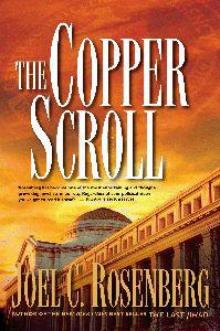 The Copper Scroll
The Copper Scroll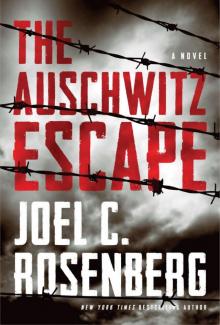 The Auschwitz Escape
The Auschwitz Escape The Last Jihad
The Last Jihad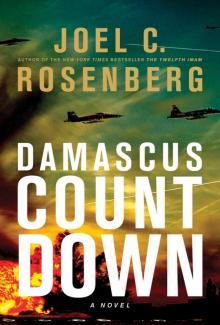 Damascus Countdown
Damascus Countdown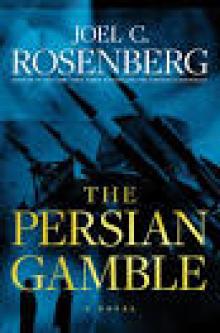 The Persian Gamble
The Persian Gamble The Jerusalem Assassin
The Jerusalem Assassin Dead Heat
Dead Heat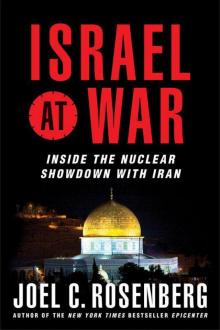 Israel at War: Inside the Nuclear Showdown With Iran
Israel at War: Inside the Nuclear Showdown With Iran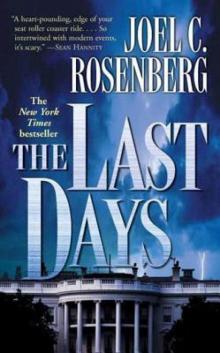 The Last Days
The Last Days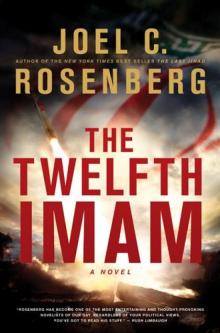 The Twelfth Imam
The Twelfth Imam Epicenter 2.0
Epicenter 2.0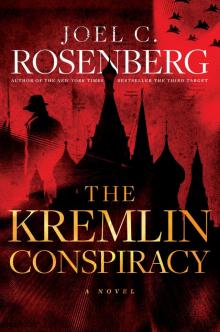 The Kremlin Conspiracy
The Kremlin Conspiracy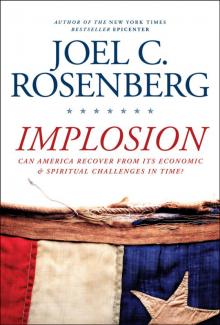 Implosion: Can America Recover From Its Economic and Spiritual Challenges in Time?
Implosion: Can America Recover From Its Economic and Spiritual Challenges in Time?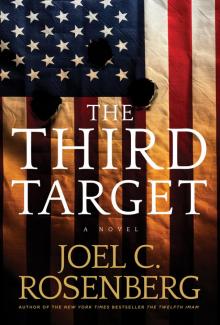 The Third Target: A J. B. Collins Novel
The Third Target: A J. B. Collins Novel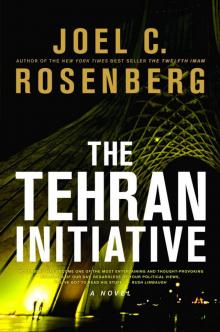 The Tehran Initiative
The Tehran Initiative Inside the Revolution
Inside the Revolution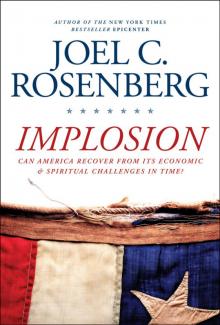 Implosion
Implosion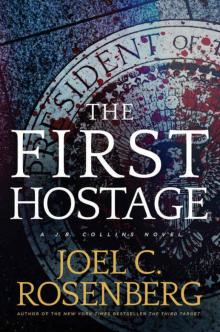 The First Hostage: A J. B. Collins Novel
The First Hostage: A J. B. Collins Novel